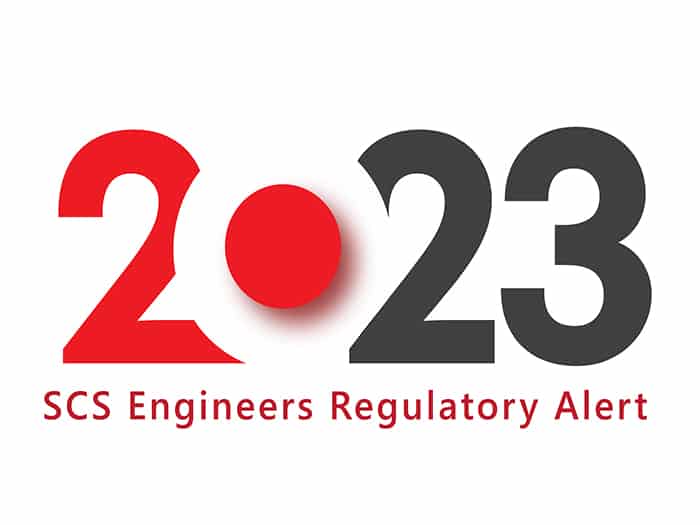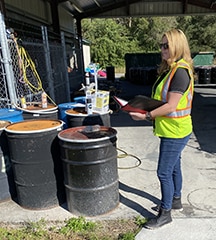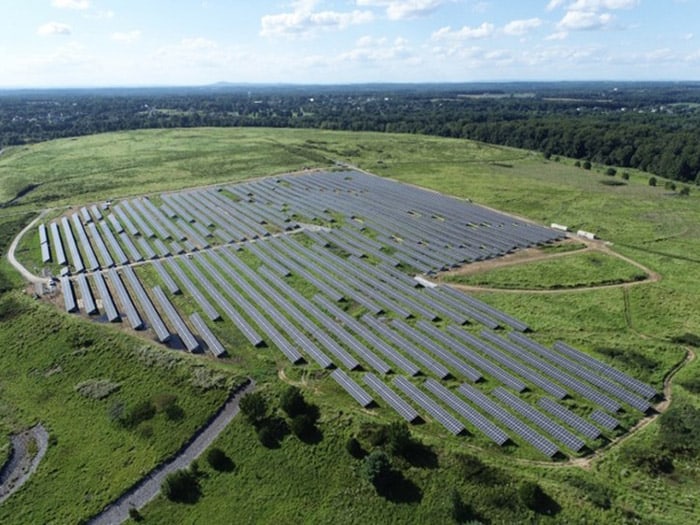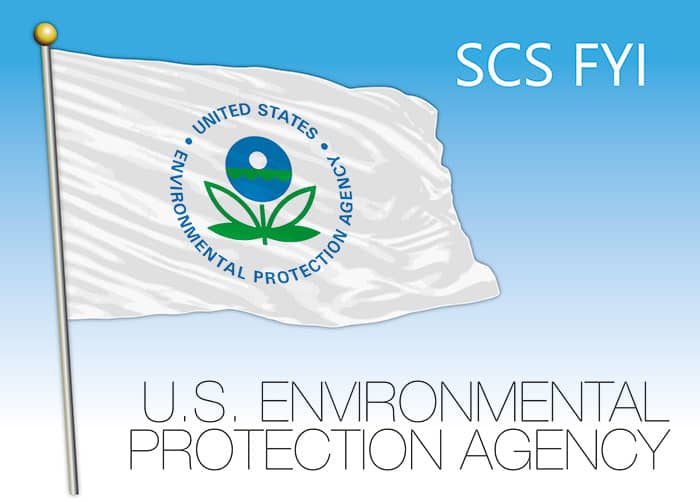

SCS Engineers Vice President, Betsy Powers, is one of the industry leaders who will teach at the University of Wisconsin’s Solid Waste Landfill Design Short Course, March 27-30, at UW campus in Madison.
Learn about the critical factors of solid waste landfill design, operations, evolving industry issues, and economics. Learn from expert and diverse course faculty (top-flight researchers, owners at the cutting edge of evolving practice, industry experts). Get a firm grasp of the background and design specifics to compete in this industry, including industry-leading information on the principles and practices of solid waste landfill development, design, construction, operations, and management. Understand practical emerging technologies including:
This course will guide you through the development process of a successful solid waste landfill, from cradle to grave. Industry experts will share critical factors and insights. Interactive discussion and idea exchange will be emphasized. It is intended for the gamut of industry professionals from civil engineers and landfill designers to landfill owners and operators, as well as local, county, and state regulatory agencies; public works professionals; facility managers; contractors and estimators; geosynthetic manufacturers and reps; planners; and everyone in between.
Qualifies for CEU and PDH credits.

The U.S. Environmental Protection Agency (EPA) has issued a proposed rulemaking (Federal Register, Vol. 87, No. 198, Friday, October 14, 2022) that would address a 2008 Fugitive Emissions Rule that was subsequently granted reconsideration based upon a petition from the National Resources Defense Council (NRDC). The key issue is how fugitive emissions are considered under Section 111 of the Clean Air Act (CAA), as related to the definition of modification.
Modification means any physical change in, or change in the method of operation of, a stationary source which increases the amount of any air pollutant emitted by such source or which results in the emission of any air pollutant not previously emitted. 42 U.S. Code § 7411(a)(4).
In 2008, the Bush EPA published its Fugitive Emissions Rule that sought to “reconsider” the inclusion of fugitive emissions under this language. Fugitive emissions are defined as:
Those emissions which could not reasonably pass through a stack, chimney, vent, or other functionally-equivalent opening.
NRDC’s petition for reconsideration argued that the Bush EPA weakened the standard for determining major modifications by excluding fugitive emissions from major Prevention of Significant Deterioration (PSD) and non-attainment New Source Review (NSR) applicability.
The proposed rulemaking would result in a formal reversion to the pre-2008 language. EPA’s Director for its Office of Air Quality Planning & Standards (OAQPS) has indicated that the rule “would require fugitives to be counted in all new and modified major source determinations,” effectively ending the Bush-era limitations on counting of fugitive emissions.
The potential impact of EPA’s planned fugitive emissions rule may prove significant and is expected to affect a wide range of diverse industry sectors being impacted, such as power generation, oil & gas extraction, mining, paper mills, petroleum refining, chemical manufacturing, coatings operations, and solid waste facilities. In particular, both landfills and compost facilities can have significant fugitive emissions.
Based on our current understanding, the proposed rule will effectively eliminate the ability to exempt fugitive emissions under the current exemption in 40 Code of Federal Regulations (CFR) 52.21(i)(vii). This would mean that if a source is an existing major PSD or non-attainment NSR source for ANY pollutant, and modifies, then both non-fugitive AND fugitive emissions for ALL pollutants must be counted to see if the project is a major modification under PSD/NSR. Triggering a major modification would also mean that fugitive emissions are included in the various compliance elements of PSD or NSR (e.g., best available control technology [BACT], lowest achievable emission rate [LAER], modeling, offsets. etc.).
To add more context for landfills, as an example, if an existing landfill, which is already deemed major due to carbon monoxide (CO) or sulfur dioxide (SOx) emissions from flares (Potential to Emit [PTE] >250 tons per year [tpy]), conducts an expansion that will result in 15 tpy of new particulate matter less than 10 microns(PM10) [and/or 10 tpy of PM2.5] fugitive emissions from windblown dust, this would be a major modification under PSD, requiring BACT and modeling for fugitive PM. This could also include BACT and other requirements for fugitive methane as a regulated greenhouse gas (GHG) or volatile organic compounds (VOCs)/non-methane organic compounds (NMOCs) from the additional fugitive landfill gas (LFG) emitted from the expanded landfill. Compost facilities can also have significant VOC emissions, which could put them at risk from this rule change.
Public comment on the rulemaking ends on February 14, 2023, which is an extension of the previous deadline. The solid waste industry will provide comments through the Solid Waste Association of North America (SWANA) and the National Waste and Recycling Association (NW&RA). This will be the last chance to have any effect on the rulemaking. Otherwise, landfills and possibly compost facilities could face more stringent requirements under the PSD and NSR programs when it comes to fugitive emissions.
Landfill and compost facility owners and operators may direct their questions pertaining to specific facilities to their Project Managers or .

Executing Brownfield Redevelopment
Green spaces are dwindling rapidly as real estate development forges ahead; meanwhile, a plentiful inventory of brownfields lie idle or underused that have great potential to become vibrant, revenue-generating resources.
Well-executed brownfield redevelopment projects make the most of existing infrastructure, leaving green spaces green. They create jobs and increase property values. They improve the health and safety of the environment and people. And turning former liabilities into neighborhood jewels cultivates a spirit of goodwill among residents.
As developers and governments realize the benefits, old gas stations, defunct factories, and closed landfills are among the properties redeveloped into community parks, retail, industrial, or mixed-use properties to become productive assets.
But while communities and private investors can reap tremendous payoffs, successfully repurposing brownfields can be complicated. They may be laden with hazardous substances and other contaminants from past uses, calling for specialized technical expertise to ensure sustainable environmental and financial outcomes.
Meet Amy Guilfoyle
SCS Engineers’ Amy Guilfoyle has been deeply rooted in brownfield redevelopment work for 20 years, supporting plans to ensure projects are technically sound, on time, and on budget.
Groundwater and soil assessment and remediation are her primary focus. Her job involves more than these essential tasks—from helping local governments apply for U.S. EPA Brownfield assessment and cleanup grants and voluntary cleanup state tax credits to ensuring and documenting regulatory compliance.
When Amy was a new biology graduate, she was not sure exactly what career direction she would choose until she got a full taste of fieldwork with an environmental focus.

“I like working on practical solutions to our clients’ day-to-day problems. And I like the creativity involved in finding and developing the best options in each case. Every scenario is unique, challenging you to keep the wheels in your mind turning,” she says.
Guilfoyle’s work typically begins with a Phase I Environmental Assessment, entailing an inspection of the property and a review of documents to evaluate for potentially hazardous pollutants and contamination. She will move on to a Phase II Environmental Assessment, depending on her findings, collecting and analyzing soil and groundwater samples to determine concentrations, locations, and other details to inform what may become her next course. The results help lead her team in developing and executing a rigorous cleanup strategy to meet regulatory standards.
The practiced brownfields veteran has her work cut out for her, especially on her dedicated turf; the state of Florida, whose groundwater and soil quality standards are even more rigorous than the U.S. EPA’s. Guilfoyle must not only stay on top of stringent regulatory demands but know how to strategically approach complex challenges tied to the region’s unique physical conditions.
“For one, as we monitor and plan remediation, we consider soil characteristics. Like much of the Southeast part of the country, Florida is sandy, making it easier for contaminated water and materials to move through the ground than in rocky areas,” she explains.
“Additionally, we give careful thought to the fact that the water table is shallow, which means saturated soil is close to the land surface, increasing the risk for groundwater contamination.”
Protecting groundwater is the most meaningful work she can do in her eyes.
“Keeping groundwater clean is so important to our public health and safety, as it is the major source of drinking water,” Guilfoyle says.
Sizing up cleanup options
In determining the best method to tackle soil and water impacts, she considers multiple variables: regional standards, the proposed use of the property, and clients’ overall goals.
Every success story hinges on protecting human health and the environment while keeping an eye on the bottom line—economics.
“Our clients are taking on huge projects that can have substantial cleanup costs. Our priority is to develop solutions that limit their out-of-pocket costs and liability. But doing it more effectively, so the outcome is a rich resource that serves communities well into the future,” Guilfoyle says.
A solid understanding of regulations is key to delivering sound technical and financially feasible outcomes.
She exemplifies this, beginning with a recent approach involving removing contaminated soil and using the nonimpacted soil as part of a pond construction to expand stormwater holding capacity.
“In this scenario, you save on the cost to transport hundreds of tons of soil and put it to use to build out existing infrastructure. Also, fewer trucks are coming in and out of the site, mitigating a nuisance and greenhouse gases.
“In other scenarios, we have been able to negotiate cleanup levels above the standard by providing documentation to show they are sufficient for full compliance.”
Forging industry relationships through professional engagements
Guilfoyle knows the agencies well through her work at SCS and professional engagements beyond.
Among her involvement, she’s a board member of the Florida Brownfields Association (FBA), supporting educational and outreach efforts and legislative initiatives to secure funding for cleanup projects.
She serves on the Florida Association of Environmental Professionals (FAEP) board, reporting business activity to local chapter members.
She lends her expertise as a board member for Metropolitan Environmental Training Alliance (METRA), promoting free and low-cost training on hazardous waste management requirements and other environmental regulations.
Outside her leadership roles in industry organizations, she finds time for her passion—telling others about the environmental industry. She has been involved with teaching Boy Scouts and Girl Scouts at Science, Technology, Engineering, and Mathematics (STEM) events and introducing college students to job opportunities in these disciplines.
“It’s important to provide a real role model in science and introduce youth to the wide range of job opportunities. We need more sharp young minds. And we especially need more women in environmental sciences,” Guilfoyle says.
“We have done good work. But we have more ahead of us. We will continue making progress by increasing youths’ awareness of what we do and why we do it–and by educating and supporting industry organizations.”
Brownfield Redevelopment Resources, Funding, Careers:
Join SCS Engineers at Oklahoma State University’s STEM Career Fair on March 2, 2023.
SCS is an employee-owned, award-winning environmental engineering, consulting, and construction firm with offices nationwide. We are seeking a wide variety of dedicated, hard-working professionals with Science, Technology, Engineering, and Mathematics (STEM) backgrounds.
The fair is FREE to students.
Click for more information and registration

Success in such projects helps municipalities move closer to achieving their sustainability goals. These two Maryland projects provide value to their communities by lowering greenhouse gas emissions, providing renewable energy and environmental integrity, and creating jobs and savings for taxpayers. That’s a win for Maryland and its citizens.
Closed landfills require significant maintenance and environmental compliance expenditures for many years, more often decades. Recent changes in federal tax law under the Inflation Reduction Act have dramatically improved opportunities for public and private sector landfills to convert a liability to an income-producing asset. The Inflation Reduction Act includes provisions for a 30% investment tax credit for solar projects with other provisions that can increase this incentive to as much as 50%. There are also equivalent provisions for direct payment to non-taxpaying entities such as cities and counties. An excellent summary has been prepared by the law firm of Holland & Knight and is available here.”
Two Maryland counties are among recent SCS Engineers’ clients who are converting their idle properties into revenue-generators that serve their communities—they are installing solar farms, a growing trend on closed landfills. The Oaks Landfill in Montgomery County, MD, is one.
The Oaks Landfill Photovoltaic Array project will be a 6-megawatt (MW) system on 170 acres of the closed landfill, the largest solar project on county property. Governed through a power purchase agreement, two MWs are allocated for the County. The other four MWs are for a community solar project, with 100% of the electricity generated, provided to low and moderate-income subscribers. In total the solar energy system is expected to generate 11.4 million kilowatt hours of electricity each year – enough to power 930 homes. The solar power is expected to reduce greenhouse gas emissions as much as taking 1,740 cars off the road.
It will be one of the largest solar farms nationwide to allocate all power to disadvantaged communities. The array is on schedule to operate in 2023.
Siting solar energy installations
Ideal sites for these facilities are fairly flat (preferably less than 15% slope) with open spaces conducive to photovoltaic system installation. Favorable sites are also in close proximity to utility connection points providing developers a viable means to bring their product to market and consumers. While properties like closed landfills provide ideal locations, the projects command a robust multidisciplinary redevelopment approach. Important skills for successfully engineering and permitting these projects include landfill engineering expertise and experience with state and local permitting processes.
You can learn more about renewable energy solutions here.

On December 5, 2022, the EPA released a memo providing direction under the NPDES permitting program to empower states to address known or suspected discharges of per- and polyfluoroalkyl substances (PFAS). Note that the list of Applicable Industrial Direct Discharges (page 2, paragraph A.1) includes landfills. The memo cites state programs in Michigan and North Carolina that other states may want to replicate. These approaches and others could help reduce PFAS discharges by working with industries, and the monitoring information they collect, to develop facility-specific, technology-based effluent limits.
As stated in its memo, the EPA’s goal is to align wastewater and stormwater NPDES permits and pretreatment program implementation activities with the goals in EPA’s PFAS Strategic Roadmap. The memo recommends that states use the most current sampling and analysis methods in their NPDES programs to identify known or suspected sources of PFAS and to take actions using their pretreatment and permitting authorities, such as imposing technology-based limits on sources of PFAS discharges.
The Agency hopes to obtain comprehensive information by monitoring the sources and quantities of PFAS discharges, informing other EPA efforts to address PFAS. The EPA will need this information since new technologies and treatments are in development but remain unproven to work successfully in specific industries.
Other proposed actions by the Agency include designating two PFAS as Comprehensive Environmental Response, Compensation, and Liability Act (CERCLA) hazardous substances and an order under EPA’s National PFAS Testing Strategy requiring companies to conduct PFAS testing and nationwide sampling for 29 PFAS in drinking water starting in 2023.
In a letter to Congress, SWANA and NWRA associations request that regulation under CERCLA for addressing PFAS contamination assign environmental cleanup liability to the industries that created the pollution in the first place. Both associations note that landfills and solid waste management, an essential public service, do not manufacture nor use PFAS. Therefore, the general public should not be burdened with CERCLA liability and costs associated with mitigating PFAS from groundwater, stormwater, and wastewater.
Resources:
Meet SCS Vice President Ray Tierney at the Wisconsin Bankers Association Bank Executives Conference, February 8-10, 2023, at the Kalahari Convention Center in the Wisconsin Dells.
This conference is ideal for community banking executives to come together for networking and education. Attendees will enjoy two days of networking, several national keynote speakers, and breakout sessions.
Click for conference details and registration information
SCS Engineers is a Silver Sponsor of the Municipal Electric Utilities of Wisconsin’s (MEUW) 2023 Electric Operations Conference & Expo, January 11-13, 2023, at the Kalahari Resort in the Wisconsin Dells.
Click for conference details and registration information.
Meet SCS Engineers professionals at the Wisconsin Agri-Business Association’s Agribusiness Classic, January 11-12, 2023, at the Alliant Energy Center in Madison.
The Wisconsin Agribusiness Classic is Wisconsin’s premier agribusiness industry event drawing interest and participation from all confluences of the industry from throughout the Midwestern states. The program is held at the Alliant Energy Center each January and boasts an attendance of nearly 1,000 attendees. The conference and tradeshow is a collaborative effort between the Wisconsin Agri-Business Association and the University of Wisconsin.
The depth of coverage and exhibits provided through the conference and tradeshow makes it clear why the Wisconsin Agribusiness Classic is Wisconsin’s premier industry event.
Joan the Utility Solid Waste Activities Group (USWAG) at its 9th Annual Coal Combustion Residuals (CCR) Workshop, April 17-19, at the New Orleans Marriott.
The CCR Workshop is designed to provide attendees with an understanding of the CCR Rule, a key regulatory compliance.
Abstract: CCR groundwater monitoring programs require routine detection monitoring around regulated units. The purpose of routine detection monitoring is to identify situations where groundwater quality could be impacted by contaminants mobilized from CCR. Background data are collected to characterize the statistical distributions of groundwater quality parameters in the aquifer where there is no potential impact from regulated units. During operational, closure, and post-closure care activities the same groundwater quality parameters are sampled periodically downgradient from the regulated unit and compared to these background data. Any statistically significant increases over background are investigated as a potential result of CCR leachate impacting groundwater quality.
The procedure for design and implementation of a groundwater monitoring plan foresees that all routine detection monitoring program will generate false positive results, and the EPA Unified Guidance recommends that the monitoring plan be designed to minimize the site-wide false positive rate. For CCR monitoring programs, the number of well/parameter pairs and sampling frequencies are fixed by site-specific and regulatory requirements. This leaves the CCR permittee with two focus areas to minimize the site-wide false positive rate. The first is a robust characterization of background that captures both the spatial and temporal variability at the site. The second is a complete characterization of leachate composition, including unregulated constituents, and the incorporation of correlation into the statistical comparison to background. These two focus areas can be used to minimize costly assessment and corrective action activities.
Top 3 things audience will learn:
1) Routine groundwater detection monitoring will generate false positive results.
2) There are two areas that a CCR groundwater monitoring program should focus on to minimize false positives: (1) robust characterization of background; and (2) robust characterization of leachate composition
3) Building a CCR groundwater monitoring program upon these two focus areas will ultimately help reduce costly assessment and corrective action activities resulting from false positives.
In 2014, the Environmental Protection Agency (EPA) finalized regulations addressing the disposal of coal combustion residuals (CCR) generated by electric utilities and independent power producers. The rule regulates CCR as non hazardous waste under the Resource Conservation and Recovery Act (RCRA) and establishes national minimum criteria for existing and new CCR landfills and surface impoundments, including location restrictions, design and operating criteria, groundwater monitoring and corrective action, closure and post closure care, and recordkeeping, notification and internet posting requirements. Because the rule is self implementing, it is critical that owners and operators of CCR management units and engineering consulting firms possess a thorough understanding of the rule in order to ensure consistent compliance with these new federal standards.